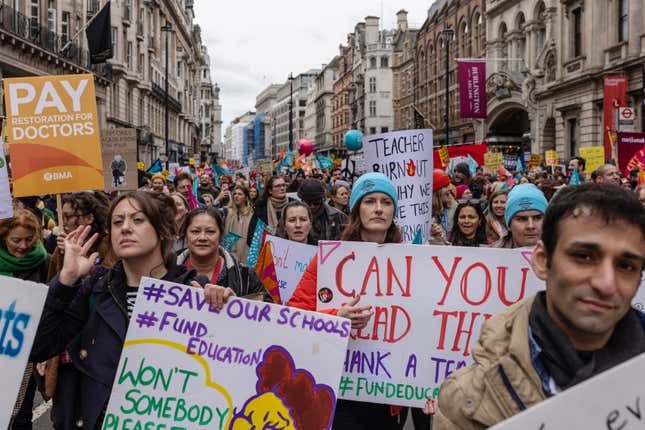
Unionized members of the UK’s passport offices will go on strike next month over low wages, likely disrupting the delivery of passports during the busy easter holiday. This labor action comes after 100,000 civil servants, including doctors, teachers, and railway workers, walked off the job on Wednesday (March 15).
The Public and Commercial Services Union (PCS) announced that more than 1,000 Passport Office workers will strike for five weeks starting on April 3. They demanded a 10% raise in wages for civil servants in order to keep up with inflation in a statement released on Friday (March 17).
The Home Office said it was “disappointed” by the union’s decision, and would work to “manage the impact of strike action” while working to ensure vital services to the public.
There are more than 4,000 passport workers, meaning approximately one in four employees will walk out. The PCS general secretary Mark Serwotka confirmed employees had rejected an initial offer for a 2% pay raise by the government.
“They’ve had six months to resolve this dispute but for six months have refused to improve their 2% imposed pay rise, and failed to address our members’ other issues of concern,” Serwotka said, confirming that a strike fund had been established to ensure staff would be paid in full during the extended walkout.
Approximately a million people applied for passports during the same 5-week period last year, with summer vacations abroad increasing application numbers during the spring. The current waiting time for a new passport is 10 weeks, but this is expected to increase due to the strikes.
Who is striking in the UK?
🏥 The NHS: Ambulance crews, call handlers, and nurses have reached a pay raise deal with the government after staging the largest strike in the history of the NHS on February 6. Union members will now vote on the agreement.
🩺 Junior doctors: Represented by the British Medical Association, and not part of the NHS Union, junior doctors walked out from the job for 72 hours this week (March 13-15), demanding a 35% wage hike. More than 98% of members voted to strike.
🚆 Rail workers: Workers in rail services across the UK held the first of a series of four 24-hour strikes on Thursday (March 16),,,causing more than half of services to stop running. Members of the National Union of Rail, Maritime and Transport Workers (RMT) have staged numerous strikes over the last six months. Those working for Network Rail suspended strikes as they vote on a new offer, and RMT union chief Mick Lynch said he expects a new round of talks to resume as early as next week.
🍎 Teacher: The National Education Union has organized two major strikes in the last month to protest low wages relative to high inflation. The union has agreed to suspend strikes for the next week while they hold “intensive talks” with the government.
🎙️ Journalists: The BBC’s regional TV and radio bulletins, as well as their online content, were paused after a 24-hour strike organized by the National Union of Journalists. The strikes were protesting planned cuts to local radio shows.
🇬🇧 Civil servants: Civil servants–including driving test examiners, vehicle inspectors, border force employees, tax workers, and workers at the passport office–joined the massive nationwide strike on March 15. The wide-ranging group of government employees is represented by the Public and Commercial Services union and has announced new strikes in the coming weeks.
Strongest labor movement since Thatcher
The UK has seen the largest number of strikes and labor actions since the years of conservative prime minister Margaret Thatcher, when industries across the country were shut down by workers protesting low wages and draconian anti-union laws.
During the miners’ strike of 1984-1985, which is considered one of the largest labor actions of the modern era, the British economy lost 26 million working days, a common metric for measuring labor actions calculated by multiplying the total number of working days lost in a work stoppage by the number of striking workers.
There are parallels between the two eras. Last year, real wages (earnings with inflation factored in) declined by 3%, the largest dip since 1977, which was the year Thatcher became prime minister.
However, the scale of protests is still comparatively small. Unions estimated that strikes caused one million working days to be lost in December of last year, the worst month for walkouts last year. For comparison, there were 11.7 million working days lost in September 1979, the worst month of strikes during Thatcher’s rule.
British strikes, by the numbers
220,000: Number of working days lost to strikes in January, according to a report by the UK Office for National Statistics released this week. The country has lost 2.67 million days to labor disputes since June last year
133,000: The number of workers who went on strike this week to protest low wages for civil servants, according to the Public and Commercial Services Union
$2 billion: The amount strikes cost the British GDP over eight months last year. This amounts to roughly 0.1% of the UK’s expected GDP over the same period, with the total value of the British economy estimated at about $2.7 trillion last year
23.1%: Union membership rate in the UK for 2021, the most recent year on record. That is the lowest figure since 1979, when half of all British citizens were in a union
12.8%: Private sector union membership in 2021, compared to 50.1% membership in the public sector
3%: The decline in wages in 2022, when inflation is factored in, according to the Trade Union Congress. It marks the single biggest drop in wages since 1977
Related stories:
⛏️ UK workers are going head to head with the government on budget day
🇪🇺 The UK and the EU have reached an agreement on Northern Ireland
🇬🇧 The UK is expecting its largest wave of strikes in over 30 years